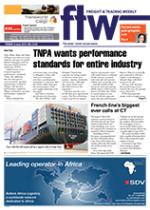Fuel costs and rising salaries
have pushed up logistics
costs in South Africa and
the industry will need to
think out of the box to come
up with solutions to an
issue that is compromising
economic growth.
That’s a key finding of
the tenth State of Logistics
Survey released last
week and published
by the Council
for Scientific
and Industrial
Research (CSIR)
in collaboration
with Imperial
Logistics and
Stellenbosch
University. It
looks back over
a decade of
measuring
logistics
costs while for the first time
providing a forecast of the
current calendar year’s costs.
It points out that a
disproportionate
growth in
cost drivers
rather than a
deterioration in
efficiency is the
main reason for
South Africa’s
rising logistics
costs.
In 2012 the
absolute cost of
logistics
was
R393 billion. The estimate
for 2013 is R423 billion
while the expected figure for
2014 is between R456 billion
and R470 billion, depending
on fuel inflation.
Fuel is clearly the key
cost driver, according to
Professor Jan Havenga,
director at
the Centre for
Supply Chain
Management
at Stellenbosch University.
“A few years ago fuel
contributed 30-35% to
transport costs but it’s now
approaching the 40% mark.”
This year, however,
drivers’ wages have emerged
as a growing concern. “It’s
always been important in
terms of transport costs,”
says Nadia Viljoen, scientific
editor of the survey. “But
now with recent events we
are becoming aware of the
state of wages and how
important your people are,”
she said.
In Viljoen’s view South
Africa’s logistics is highly
efficient. “But improving it
is not just about doing what
we have been doing better.
We can’t merely carry on as
we are, saving fuel as we go
and keeping stock down. It’s
about changing the way we
transport in our country as
a whole – about addressing
infrastructure and about
changing the way the private
sector does supply chain.”
Hans Ittman of HWI
Consulting believes that as
a logistician, you can make
your trucks more efficient,
you can improve the load
capacity of your trucks –
you can do a lot of things
– but eventually the big
difference comes with the
use of different modes. “The
biggest shift needs to be to
get stuff back on rail. But
Transnet can’t do it on their
own.”
Facilitating the road to
rail shift is top of the agenda
for TFR, but executive
manager Sandra Gertenbach
says rebuilding industry
confidence is one of the
biggest challenges they face.
“We come from a legacy of
declining market share and
services and have to turn
that around. A big part of
it is improving efficiency
and we are already starting
to see a turnaround." TFR
welcomes private sector
participation, she said, and
has entered into deals with
Imperial Logistics and
Barloworld Logistics.
Fanie Pretorius of the SA
Shippers’ Council believes
an important element of
rail’s regeneration is its
interaction with the port.
We need to see reliability
and predictability.
“But what needs to be
looked at is not only rail
but the port interaction,”
he said.
Ultimately it’s all about
greater supply chain
integration. “Industry is
very good at optimising
what it does function by
function, “ says Viljoen.
“What we need to see
is integration across all
functions in the supply
chain so that there is
visibility and everyone is
working together to achieve
the same goals.”
And it’s not only about
transport and logistics.
Cobus Rossouw, chief
integration officer at
Imperial Logistics, says that
the industry must link macro
economics with business
and micro economics.
“We’ve started looking at the
economic structure of the
country, how it influences
logistics and how logistics
influences that,” he said.
“There’s a drive towards more
local beneficiation and that
may change the way freight
flows in our country – which
may influence the logistics
sector. The question is
whether there is anything the
logistics sector should do to
make local trade flourish. If
the economy does well the
logistics sector does well so
it’s in the interests of the
logistics sector to do things
that will make the economy
grow.”
INSERT & CAPTION 1
It’s about changing
the way we
transport in our
country as a whole
_ about addressing
infrastructure and
about changing the
way the private
sector does supply
chain.
– Nadia Viljoen
INSERT & CAPTION 2
If the economy does
well the logistics
sector does well so
it’s in the interests of
the logistics sector
to do things that will
make the economy
grow.
– Cobus Rossouw

